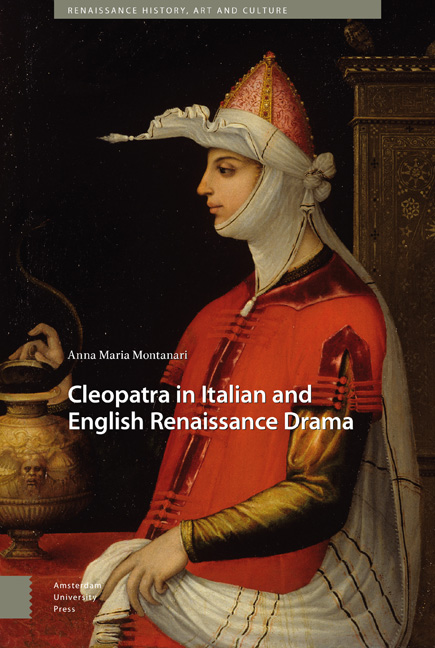Book contents
- Frontmatter
- Dedication
- Epigraph
- Contents
- List of Illustrations
- A Note on the Cover
- List of Abbreviations
- Acknowledgements
- Introduction
- 1 ‘No Humble Woman She’
- 2 ‘The Subject of Talk the World Over’
- 3 The Egyptian Queen's Rebirth
- 4 The Great Theatre of Cleopatra
- 5 ‘The Wanton Luxurie of Court’
- 6 ‘A Lass Unparalleled’
- Conclusion
- Bibliography
- Index
2 - ‘The Subject of Talk the World Over’
Published online by Cambridge University Press: 21 November 2020
- Frontmatter
- Dedication
- Epigraph
- Contents
- List of Illustrations
- A Note on the Cover
- List of Abbreviations
- Acknowledgements
- Introduction
- 1 ‘No Humble Woman She’
- 2 ‘The Subject of Talk the World Over’
- 3 The Egyptian Queen's Rebirth
- 4 The Great Theatre of Cleopatra
- 5 ‘The Wanton Luxurie of Court’
- 6 ‘A Lass Unparalleled’
- Conclusion
- Bibliography
- Index
Summary
Abstract
Late-antique historical accounts about Antony and Cleopatra: Tertullian’s Ad Martyras; John, bishop of Nikiu's chronicle; Fabius Placidus Fulgentius’ De aetatibus mundi et hominis. The Middle Ages and the Egyptian queen. Survey of the main Italian medieval readings of her story: Dante’s, Petrarch's and Boccaccio’s. The English medieval versions of the myth of Cleopatra: Chaucer’s, Gower's and Lydgate's works.
Keywords: Late-antique historians; Italian medieval writers; English medieval writers
Enchantress and Martyr
Antiquity slowly became the Middle Ages but late-antique historical accounts, whether pagan or Christian, maintained a similar attitude towards Antony and Cleopatra. Two of them in particular, Orosius’ Historiae adversus paganos – commissioned by St. Augustine, as a corollary or appendix to his De civitate Dei (AD 413-426) – and the anonymous De viris illustribus (first to fourth century), whose author was probably a pagan – definitively solidified and took to extremes the negative portraits of the two lovers. In Orosius’ compendium, Antony is systematically denied any military prowess and his greed for money and power is emphasised. In De viris illustribus, Cleopatra turns into the dark heroine of an Oriental tale, ‘Haec tantae libidinis fuit, ut saepe prostiterit, tantae pulchritudinis, ut multi noctem illius morte emerint’ [‘She was so lustful that she would often sell herself, so beautiful that many men bought a night with her at the cost of their own death’] (86.2).
Not many years later, Latinius Pacatus Drepanius, in his panegyric to the Emperor Theodosius (AD 389), retold the epic confrontation between East and West, now more than ever conceived of as a struggle between moral corruption and liberty and duty. He believed it all to be true, but his account nevertheless has the flavour a literary tale (XXXIII.1-2). The great and famous Alexandrine war, distorted by exaggerations and mystifications, was inevitably bound to appear increasingly unreal, in later centuries. Strange as it seems, while her life was still condemned by historians, Cleopatra's voluntary death was praised by at least one Christian Latin writer. In his treatise Ad nationes, Tertullian associated her with the cult of martyrs (1.18.3).
- Type
- Chapter
- Information
- Cleopatra in Italian and English Renaissance Drama , pp. 41 - 58Publisher: Amsterdam University PressPrint publication year: 2019



